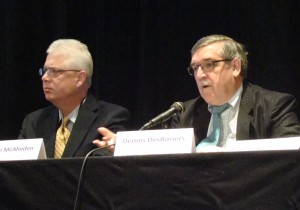
CAR's Sean McAlinden, left, and Canadian auto analyst Dennis DesRosiers answer questions about the state of the U.S. auto industry.
While some still hold out for huge buildup in auto sales, a pair of analysts said they believe the recovery will be moderate and steady through most of the current decade.
Speaking at the Center for Automotive Research’s Road to Renewal II conference in Dearborn, Canadian auto analyst Dennis DesRosiers said many consumers remain skeptical about buying a new car as the economy continues to come back from the worst recession since the Great Depression of the 1930s.
“It’s hard to sign up for a new vehicle when you see the value of your house going down every year,” DesRosiers said.
Sean McAlinden, CAR’s executive vice president of research and chief economist, agreed that sales growth will be moderate. He projected 13.4 million vehicle sales in 2011, rising to 14.4 million in 2013 and 14.9 million in 2014. Then again, DesRosiers said he made his projections before the current crisis in Japan where the recent earthquake and tsunami threaten to stop production at auto plants all around the world.
DesRosiers said he expects less growth in the number of miles driven. He also expects the scrappage rate to go down, meaning car owners will keep their vehicles longer. In all, he expects a 8.7 percent decline in auto sales for the current decade compared to the last.
McAlinden wasn’t so sure about that. Lower scrappage rates mean people are keeping their cars longer, something he isn’t sure will happen.
“I wonder how long the low scrappage rates will hold up,” he said.
Responding to a question from the audience, DesRosiers said alternative some people would say that vehicles with new powertrain technologies, particularly hybrids have been somewhat successful. He said this could be the decade of the hybrid as the technology finds its way into more cars.
He said he would like to see diesels get more attention in the U.S., although the government has made it clear it doesn’t care for the technology.
“America doesn’t like diesels. I understand that,” DesRosiers said. “I don’t get it.”
DesRosiers said he thinks electric is the technology that will eventually win out.
“All roads lead to electric. That road may be 2030 or 2040, not 2020.”
